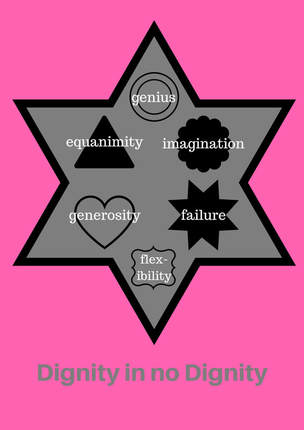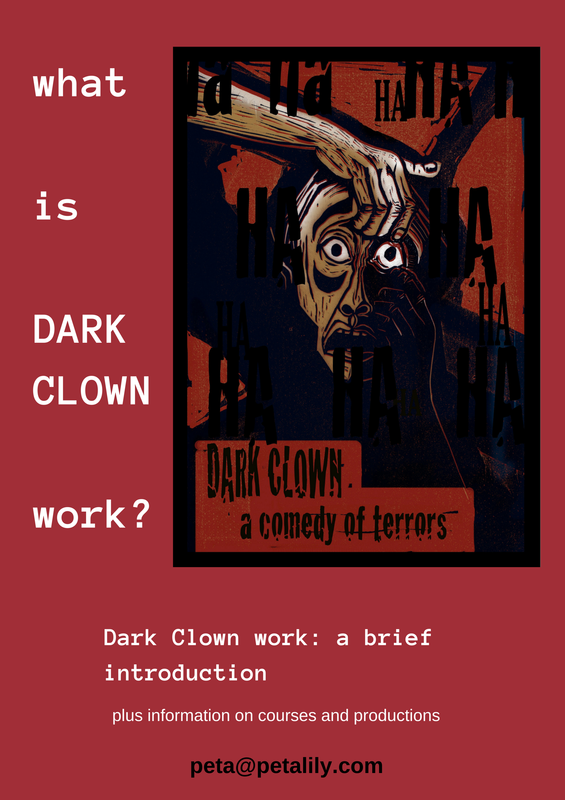
...recently taught a four day Clown workshop at RADA - wonderful participants and we worked with Clowns delivering text, too.
I had a sudden inspiration to ask them to make their personal Clown Coat of Arms. I did a rough one myself that day on the back of my notes. Today I sat down and made this - different to the first one (I think there are so many different versions I could make).
This in the shape of a star because an actual shield shape is in the vernacular of war and defence, no? The clown works best with no defences. Not defenceless, but flexibly resourceful and responsive - as in Aikido. Like a good facilitator, the Clown needs to be able to include responses. Jean-Claude Audergon - who works using Arny Mindell's Process Oriented Psychology in many contexts including Conflict Resolution - used to say that a good facilitator needs to be like Swiss Cheese i.e. full of holes 'the bullets go straight through'. The aim is to take nothing personally - it's best to take the point of view that even the person taking the 'shot' is just channelling a spirit of the moment, making a cry for an unmet need, giving voice to something that is not yet present in the room.
Genuis is the clown's genius - I could have equally written creativity or creative spark or intuition.
Imagination is separately present here - but I see the genius as the plug into the collective flow which we could call Imagination (like Wordsworth's way of using 'imagination' I guess, but funnier).
Equanimity (not having a polarised, strict value-driven point of view*) is in a triangle which looks to me like a visual representation of Avner the Eccentrics advice to put the weight on the under surfaces of the body (something achieved nicely by working with the Hara - the hip area centre of gravity, near/same as? the sacral chakra) - in Aikido, Chi Gung and Tai Chi this gives a flexible stability - a responsive strength, not a brittle state of 'resist', or uncharitable and effortful state of 'in spite of'.
I've already mentioned the value of flexible viewpoint - and best if that is added to a physical Flexibility or agility as well. One of the greatest leaps forward you can make in Clown training or practice is to gain the skill of agility to be in the moment. This moment, now, no, this new moment, no, THIS moment (you get the point).
Failure is a handy word to differentiate the Clown's alternate / contradictory / flexible viewpoint. The 'sad normals' modus operandi (in the main) is to to regret, hide or deflect attention away from their human failings. When the clown allows her/himself to be seen in the moment of failure - it's an act of generosity. Being able to be with 'failure' - or not place a value judgement on events that might normally be perceived as failure - is equanimity.
Ah how it all overlaps.
Failure is a moment that, with a bit of comedy craft, can be turned into success. It's an opportunity to show humanity, to release the pressure valve the 'sad normals' keep screwed down.
Generosity could have been love - but the word 'love' is so loaded...this represents for me the fact that the clown is there for the audience, with the audience.
The motto in Latin would be: dignitas indignitas which sounds kinda classy (and has a joyful rhythm and repetition - plus points!) which would in direct translation be: 'dignity in indignity' - but it looks to me less clumsy (also easier to hear - the principle of Clarity ! - see my list of C-words elsewhere in this blog) as 'Dignity in no Dignity.
(no diggity)
*look up the Buddhist story about the Farmer, the stallion and his son. The Farmer met every event with 'I don't know if it's good or bad'. You know how that dreadful thing that happened and how you railed and hurt and wept and then, years later, you are dancing with glee and gratitude that it did happen...? No? Just me?
 RSS Feed
RSS Feed
